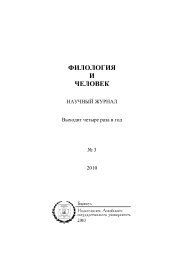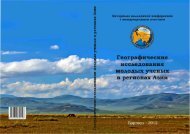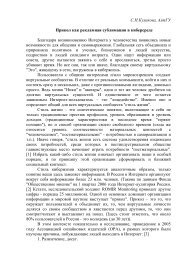Erasmus Mundus Action 1 Compendium 2009 - EACEA - Europa
Erasmus Mundus Action 1 Compendium 2009 - EACEA - Europa
Erasmus Mundus Action 1 Compendium 2009 - EACEA - Europa
You also want an ePaper? Increase the reach of your titles
YUMPU automatically turns print PDFs into web optimized ePapers that Google loves.
<strong>Erasmus</strong> <strong>Mundus</strong> Joint Doctorates<br />
Duration: 3 – 4 years<br />
EuroSPIN<br />
European Study Programme in Neuroinformatics<br />
Programme description:<br />
The human brain is by far the most intricate and complex organ known. With 10 11 neurons and 10 15<br />
connections, it effortlessly performs operations that far exceed the capability of any computer.<br />
Understanding how it achieves this will revolutionise science, health care and technology. Radical<br />
improvements in experimental methods are transforming the study of the brain into a data rich<br />
discipline, which requires the emerging discipline of neuroinformatics. Neuroinformatics combines<br />
neuroscience and informatics research to develop and apply computational tools and approaches that<br />
are essential for understanding the structure and function of the brain. Neuroinformatics thus forms an<br />
essential foundation for current and future brain research, and is critical both for basic research into<br />
brain function and biomedical research aiming at finding treatments for neurological and psychiatric<br />
diseases. Understanding the brain is also expected to have far reaching implications for information<br />
technology.<br />
The objective of this doctoral training programme is to provide top quality training for PhD students<br />
within the neuroinformatics area. Four partners participate:<br />
- Kungliga Tekniska Högskolan, Sweden<br />
- University of Edinburgh, UK<br />
- National Centre for Biological Science, India<br />
- Albert-Ludwigs-Universität Freiburg, Germany<br />
These four partners are research leaders in the neuroinformatics field, but they have complementary<br />
strengths. Each PhD candidate will pursue an interdisciplinary research project leading to a joint or a<br />
double PhD degree from two universities. The mobility periods, as well as the courses a student will<br />
follow, are planned based on which constellations of partners are involved. During the whole PhD<br />
period, which is a maximum of four years, the student will have visited all partners during an annual<br />
workshop in which all students and most of the supervisors participate. During the PhD period each<br />
student has one main supervisor from each of the two universities that grant the PhD degree. In<br />
addition to providing for the training within the field of neuroinformatics, all students are also offered<br />
training in secondary skills. The instruction language within the programme is English, and English<br />
scientific writing courses are offered, as are courses in the local languages in the different countries.<br />
Course website: www.kth.se/EuroSPIN<br />
Partners:<br />
KTH ROYAL INSTITUTE OF TECHNOLOGY, Sweden (Co-ordinating institution)<br />
ALBERT-LUDWIG UNIVERSITY OF FREIBURG, Germany<br />
UNIVERSITY OF EDINBURGH, United Kingdom<br />
NATIONAL CENTRE FOR BIOLOGICAL SCIENCES, TATA INSTITUTE OF FUNDAMENTAL<br />
RESEARCH, India<br />
Contact:<br />
Jeanette Hellgren Kotaleski<br />
Royal Institute of Technology, Dept. Computational Biology,<br />
School of Computer Science and Communication,<br />
AlbaNova University center<br />
106 91 STOCKHOLM - Sweden<br />
jeanette@csc.kth.se, mundus-eurospin@kth.se<br />
152






